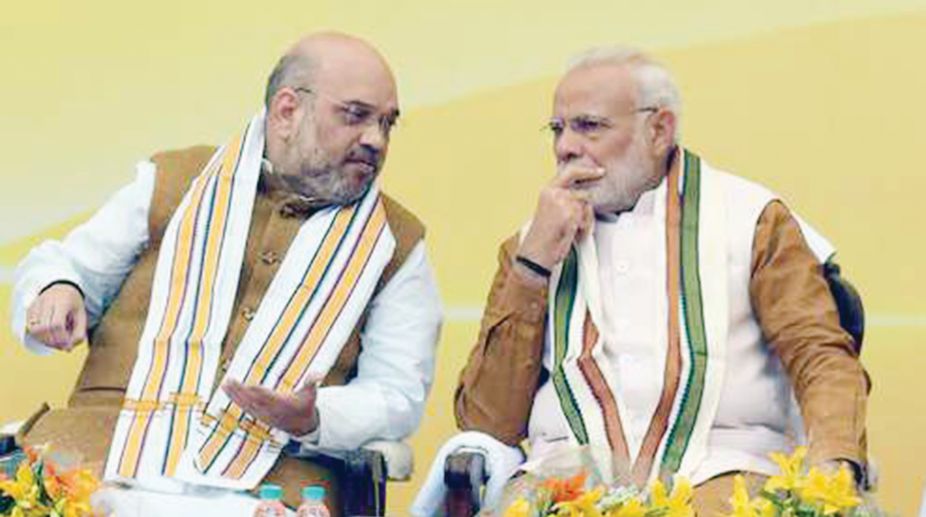Prime Minister Narendra Modi will observe a day-long fast on April 12 along BJP MPs including party President Amit Shah to protest against the washout of the second part of Parliament’s budget session due to continuous disruptions, which the BJP blamed on the Congress.
Modi will observe the fast but that would not stop him from continuing routine official work including inaugurating 10th edition of Defence Expo in Chennai at Tiruvidanthal, in Kancheepuram district that has been on edge due to protests over Cauvery water issue.
Advertisement
“The Prime Minister will also visit the Cancer Institute, Adyar in Chennai. He will unveil the plaque inaugurating the diamond jubilee building, palliative care centre (Mahvir Ashray) at Shriperumbadur, Day care centre and nurses quarter at the Adyar Cancer Institute,” an official statement from PMO said on Wednesday.
Amit Shah will observe a hunger strike in Hubli in poll-bound Karnataka, while party MPs will fast in their constituencies.
Defence Minister Nirmala Sitharaman told reporters in Chennai that she would also fast to protest the disruption of Parliament by the opposition during the just-concluded Budget Session.
“I will be fasting. PM Modi is also fasting. Fasting is not going to stop him from coming here,” Sitharaman said, after opening the DefExpo 2018 that showcases India’s capability to manufacture arms and weapons platform systems.
Union Minister Vijay Goel said that he will join the nationwide fast on Thursday morning at Shastri Park here against the divisive politics of Opposition especially the Congress.
Modi’s decision, which may be the first time a Prime Minister is observing a fast, will be part of the Bharatiya Janata Party’s day-long hunger strike that day to protest against the disruption of Parliament by the opposition.
“Despite repeated failures in derailing and disruting the development model of the Prime Minister, the opposition has been constantly disrupting Parliament and not allowing the government to bring important legislations which are aimed at making India a stronger and better nation,” the BJP said in a statement.
Modi, while addressing over 20,000 Swachhagrahis (cleanliness volunteers) at the concluding ceremony of ‘Champaran Satyagraha’ centenary celebrations in Motihari on Tuesday, accused the opposition of trying to “divide” the country and creating hurdles “from streets to parliament” in the governments’ efforts to uplift the poor and the downtrodden.
“They (opposition) are creating hurdles in the work of the government from the streets to Parliament. Today you have a government at the Centre which is working to unite the people of the country while the opposition is working to divide the people,” he said.
The BJP’s fast comes days after Congress President Rahul Gandhi led the party’s day-long fast at the Rajghat here on Monday over alleged increasing atrocities on Dalits, adivasis, and minorities marked by controversies as 1984 anti-Sikh riots accused Congress leaders Jagdish Tytler and Sajjan Kumar were asked to leave the Rajghat before Rahul Gandhi’s arrival.
Also, a picture showing some Delhi Congress leaders eating “chole bhature” at a restaurant before the protest — also held at district headquarters by party leaders across the country to promote harmony in society — went viral on social media.
Protesting against the parliament disruptions, the BJP had earlier announced that the National Democratic Alliance MPs would forego salaries along with allowances for 23 days due to the washout of the second half of the budget session.
The budget session of Parliament started on January 29 and went into a break on February 9. The two houses met for the second half of the session on March 5, which concluded on Friday.
While the first half of the session — January 31 to February 9 — recorded 134 per cent productivity in the Lok Sabha and 96 per cent in the Rajya Sabha, in the second-half, from March 5 to April 6, the lower house recorded just four per cent productivity and the upper house eight per cent.











